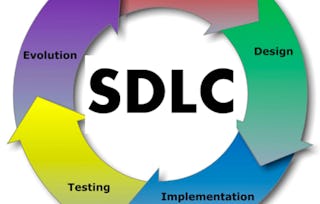While scrum and XP were transforming the software development industry, there were another set of ideas (derived from lean manufacturing and Six Sigma) that started to influence software development methods. These ideas around Lean Software Development forms the foundation of number of agile methods.

Lean Software Development

Lean Software Development
This course is part of Software Development Lifecycle Specialization

Instructor: Praveen Mittal
Access provided by Syrian Youth Assembly
48,080 already enrolled
432 reviews
Recommended experience
Skills you'll gain
Details to know

Add to your LinkedIn profile
See how employees at top companies are mastering in-demand skills

Build your subject-matter expertise
- Learn new concepts from industry experts
- Gain a foundational understanding of a subject or tool
- Develop job-relevant skills with hands-on projects
- Earn a shareable career certificate

There are 4 modules in this course
In this module, we will first learn about core lean principles from manufacturing. After that we will learn how you can apply these lean principles in software development. Finally we will learn about Lean Principles of software development in depth. At the end of this module, you will build the foundational knowledge around lean concepts.
What's included
8 videos4 readings2 assignments
In this module we will learn about Kanban and other Lean practices like Value Stream Mapping, Kaizen etc. You will gain the ability to participate effectively in using these tools and practices.
What's included
2 videos4 readings2 assignments1 peer review
In this lesson we will learn techniques like Lean Startup and Design Thinking that can help your team learn about user and market needs much faster.
What's included
3 videos1 reading1 assignment
In this module, we will learn about a technique called "Learn Startup with Design Thinking". These techniques help the team learn about user needs. You will also get an opportunity to apply this technique on a fictional case study. At the end of this module, you will be able to uncover user needs using "Lean Startup with Design Thinking".
What's included
4 videos1 assignment1 peer review
Earn a career certificate
Add this credential to your LinkedIn profile, resume, or CV. Share it on social media and in your performance review.
Instructor

Offered by
Why people choose Coursera for their career

Felipe M.

Jennifer J.

Larry W.

Chaitanya A.
Learner reviews
- 5 stars
74.07%
- 4 stars
17.12%
- 3 stars
2.54%
- 2 stars
3.24%
- 1 star
3%
Showing 3 of 432
Reviewed on Jan 5, 2019
Excellent materials provided especially the youtube links.
Reviewed on Aug 30, 2020
Amazing learning. I had a question to course instructor regarding Value Stream Mapping that I posted on week -2 forum and would appreciate the response. Thanks.
Reviewed on Jan 20, 2025
Praveen Sir has explained many key concepts with good examples and detailed explanation. Course is great!
Explore more from Computer Science

University of Minnesota

Northeastern University

University of Minnesota

University of Minnesota
¹ Some assignments in this course are AI-graded. For these assignments, your data will be used in accordance with Coursera's Privacy Notice.

